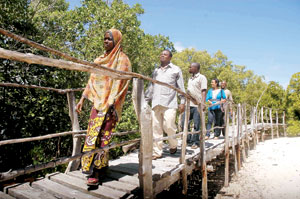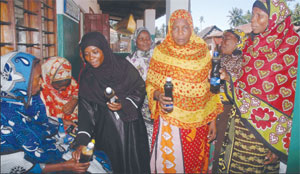By Philip Mwakio
Driving along the Likoni-Lunga Lunga Road that also serves as the gateway to neighbouring Tanzania, a sudden turn to the left leads one to Ukunda Trading Centre, only 15 minutes from the intersection.
If one follows this road further, it leads to the centre of a Swahili village dotted with palm trees, and later to a neatly painted building with the inscription, Kenya Marine and Fisheries Research Institute (KMFRI).
There is nothing unique about the structure, save for that it houses a Government department. But it also serves as the base for Gazi Women Mangrove Boardwalk group.
Its members have an interesting tale to tell. Growing up in the fishing village, and vending fish for a living has endeared them to the sea, just as their fishermen husbands — a myth-shattering occurrence in this part of the world where such preoccupations are male-dominated.
 |
Tour guide Hamadi leads others through the walkway that has turned into a stepping stone to progress. |
But the story of the women of Gazi village, which is located some 50 kilometres in the South Coast from Mombasa, goes beyond fishing.
They are also making inroads in conservation efforts.
Tour guide Mwatime Hamadi, clad in flowery leso and sandals welcomes us to the village.
"You are just in time for the high tide,’’ she breezes waving at the sea yonder.
As we walk through the village heading to the beach, we encounter more friendly faces as young children step out of their houses to shout their greetings.
At the edge of what looks like a fish landing patch, large wooden boats lay anchored, with fishermen spreading fishing nets while others repair theirs.
Beyond them lies half an acre of young mangrove seedlings. Hamadi points in that direction and informs us that the sprouting seedlings are only three months old.
"This barren land will be full of beautiful trees when you visit us next," implying the mangrove shall mature in no time.
As we headed further, our feet sunk deeper in the white pristine sandy beach towards the Mangrove Boardwalk.
Lofty perch
This is a wooden walkway that has been constructed through the mangrove forest to provide a nature walk from a lofty perch.
Hamadi says construction of the walkway was funded by the City Council of Overijse (Belgium) and International Ocean Institute (IOI), through KMFRI’s oversight.
What was an initial 300-metre walkway has since been increased to 600 metres.
The passage provides resting points where cool sea breeze and moving  |
Gazi women members display bottles of honey that they have harvested to diversify their income. All proceeds are ploughed back to community projects. Photos: Omondi Onyango/Standard |
sceneries can be accessed.
At the head of the walkway is a large Makuti shelter which can be used for breakfast or snacks.
Nine species of mangroves are found in this part of the forest. Hamadi ushered us through the lush-green forest as we watched land snails, spiders, mangrove crabs and fish beneath, serenaded by the chirping sounds of colourful birds.
There is also an oyster farm that adds to the various natural attractions that made a visit to the Gazi Mangrove Walk truly refreshing. Hamadi says the walk is popular among school parties and tourists.
Each tourist going for the leisure walk through the mangrove pays Sh100 while locals pay Sh50 per person.
To diversify their activities, and increase their income base, Gazi women have tried a hand at beekeeping.
"We are proud owners of six large hives at a secluded area within the fishing village," Hamadi explains. "The honey harvested is sold at the Ukunda Trading Centre,’’ she says.
Bright students
Proceeds from all their activities are ploughed back into the community.
"We use the money to provide bursaries to needy and bright students in the community, improve health care, equip and modernize facilities at the local Gazi Primary School, nursery and madrassa and support the supply of clean tap water for the community,’’ Hamadi says.
At a strategic edge, the walkway rises to a platform that serves as an observation point where nature lovers can while time watching the greenery scenery on the Gazi Bay.
A short distance away lies the idyllic Chale Island – one of Kenya’s best kept tourist resort which has an international holiday resort.
Retired secondary school master Ali Salim Shufa says that due to its rich history, the village of Gazi has hosted many people, including marine scientists, who use the mangrove enclaves for their field studies.
 The Standard Group Plc is a multi-media organization with investments in media
platforms spanning newspaper print operations, television, radio broadcasting,
digital and online services. The Standard Group is recognized as a leading
multi-media house in Kenya with a key influence in matters of national and
international interest.
The Standard Group Plc is a multi-media organization with investments in media
platforms spanning newspaper print operations, television, radio broadcasting,
digital and online services. The Standard Group is recognized as a leading
multi-media house in Kenya with a key influence in matters of national and
international interest.
 The Standard Group Plc is a multi-media organization with investments in media
platforms spanning newspaper print operations, television, radio broadcasting,
digital and online services. The Standard Group is recognized as a leading
multi-media house in Kenya with a key influence in matters of national and
international interest.
The Standard Group Plc is a multi-media organization with investments in media
platforms spanning newspaper print operations, television, radio broadcasting,
digital and online services. The Standard Group is recognized as a leading
multi-media house in Kenya with a key influence in matters of national and
international interest.











